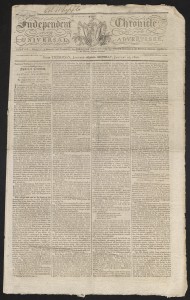Tags
"Light-Horse Harry" Lee, A. C. Hanson, Baltimore Federal Republican, Boston, Cambridge, Confederate, Congress, Continental Army, Dr. Ronald Rubin, Ebenezer Rhoades, George Washington, Henry Lee, Independent Chronicle and Universal Advertiser, John Adams, Pennsylvania, Philadelphia, Robert E. Lee, Salem, The Essex Gazette, The New-England Chronicle, Uniform Monday Holiday Act, United States, University of Utah, War of 1812, Whiskey Rebellion
 Independent Chronicle and Universal Advertiser
Independent Chronicle and Universal Advertiser
Boston: Ebenezer Rhoades, 1800
“First in war, first in peace, and first in the hearts of his countrymen, he was second to none in the humble and endearing scenes of private life: pious, just, humane, temperate and sincere; uniform, dignified and commanding, his example was as edifying to all around him, as were the effects of that example lasting.”
George Washington’s death, late in 1799, evoked hundreds of funeral orations from all over the United States. Of these, that of Henry Lee, delivered before Congress on December 26, 1799 in Philadelphia, is the most memorable. His eulogy was re-printed in newspapers throughout the nation, and in pamphlets printed on the continent and overseas. The eulogy covered nearly the entire front page of newspapers.
As in many newspapers, this issue included “A Proclamation” signed by then-President John Adams setting aside February 22, Washington’s birthday, for the public to “testify their grief for the death of General George Washington.” In 1885, February 22 was declared a federal holiday. The date was changed to the third Monday of February in 1971 following Uniform Monday Holiday Act.
“Light-Horse Harry” Lee had been summoned by Washington in 1776 to join the Continental Army. In 1778, Washington promoted Lee to the rank of major and gave him command of a small corps of irregulars. Lee’s leadership of these troops earned him his nickname. In 1794 Washington sent him to command the suppression of the Whiskey Rebellion in western Pennsylvania. From 1799 to 1801 he served in Congress.
Lee helped his friend A.C. Hanson, editor of the Baltimore Federal Republican which opposed the War of 1812, resist a mob attack. In the melee he received injuries from which he never recovered. Lee served a year in debtor’s prison. He was the father of Confederate General Robert E. Lee.
The Independent Chronicle (1776-1840) originated in 1768 as The Essex Gazette in Salem and The New-England Chronicle in Cambridge which joined forces in Boston. In 1820 it had the distinction of being Boston’s oldest running newspaper.
University of Utah copy gift of Dr. Ronald Rubin.


You must be logged in to post a comment.